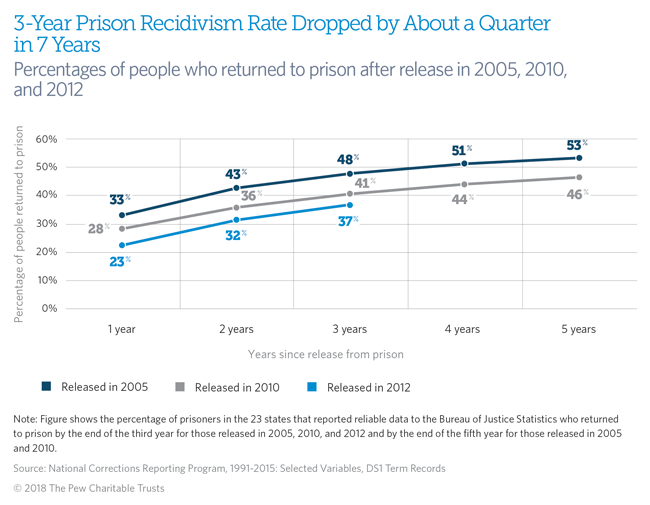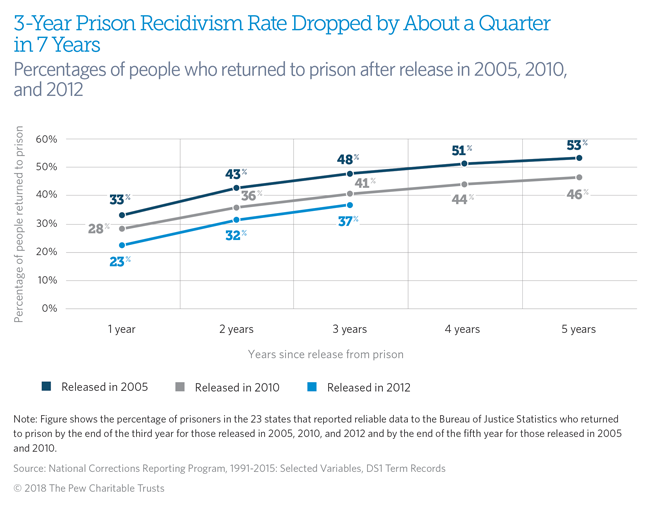ARTICLEAugust 1, 2018
By:
Adam Gelb &
Tracy Velázquez Topics:
U.S. State Policy Projects:
Public Safety Performance Project Tags:
Public safetyRead time: 2 min
The share of people who return to state prison three years after being released—the most common measure of recidivism—dropped by nearly a quarter over a recent seven-year period, according to an analysis by The Pew Charitable Trusts of federal Bureau of Justice Statistics (BJS) data on prisoners released in 2005 and 2012.
Pew analyzed publicly accessible data from the 23 states that reported reliable prison admissions and release data to BJS from 2005 through 2015. Among prisoners released in 2005, 48 percent returned to prison by the end of 2008. By comparison, among those released in those states in 2012, 37 percent had at least one new prison admission by the end of 2015. That translates into a drop of 23 percent. The states included in the analysis accounted for about two-thirds of those released from state prisons nationwide each year.
Longer-term recidivism also fell. Prisoners released in these states in 2010 were 13 percent less likely than the 2005 cohort to return to prison at least once by the end of the fifth year after release. Included in these numbers are people sent back to prison for a new crime or for violating the terms of their post-prison supervision.
The decrease in recidivism occurred alongside long-term reductions in crime. Pew’s analysis of
FBI crime statistics shows that the combined national violent and property crime rate dropped 26 percent from 2005 to 2015.
Pew undertook this research to compile and make public the most current multistate data on recidivism trends. The BJS national
report on state prison recidivism released in May 2018 presents nine years of data on people released from 30 states in 2005, but it includes no information on prisoners released since then.
To obtain more recent data, Pew researchers used publicly available administrative numbers that BJS collected from states for the National Corrections Reporting Program. State prisoners are assigned unique identifiers, enabling researchers to track when they are released and whether they return to prison—except in cases in which a prisoner is released in one state and readmitted to prison in another. Pew analyzed data from the 23 states that consistently reported prison admissions and releases every year from 2005 to 2015. The cohorts ranged from 392,000 to 458,000 released prisoners.
Evidence-based re-entry policies and programs that have been enacted in recent years have been shown to improve outcomes for people released from prison. Studies in individual states over the past decade have shown significant reductions in returns to prison from parole, including decreases of
35 percent in Georgia from 2007 to 2016 and 43 percent in Michigan from 2006 to 2015. A 2014
report by the National Reentry Resource Center highlighted eight states that had experienced reductions in recidivism, providing examples of the strategies and programs undertaken to achieve these results. And in Virginia, the Department of Corrections released an analysis in
2017 that attributed the state’s low recidivism rate to policymakers’ focus on re-entry programming and treatment.
Reducing recidivism improves public safety, reduces taxpayer spending on prisons, and helps formerly incarcerated people successfully resume family and community responsibilities. But a lack of data has complicated efforts to understand the aggregate effects of myriad federal, state, and local efforts to reduce reoffending. This analysis shows that meaningful improvements in recidivism are occurring.
Fewer People Going Back to Prison


